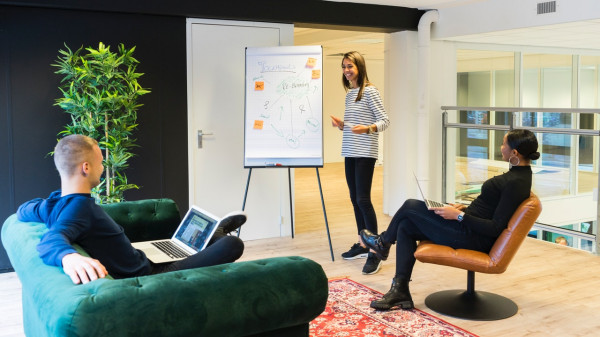Women In Transformation: Q&A with Anna Barsby
Following on from the success of our previous events, we’re thrilled to be hosting the third instalment of our Women in Transformation series, with the continued aim of sparking discussions about the issues faced by women in the transformation space.
Our speaker, CIO and Transformation Director Anna Barsby, will be sharing her thoughts on why strong leadership is paramount in helping women to become more confident when striving for senior-level roles. She will also be questioning why talented female professionals continue to get stuck at middle management level and give her advice on what organisations can do to help them get “unstuck.”
Before the event kicks off in January, we thought we’d have a chat with Anna to find out more about her interesting career and why she’s so passionate about inspiring women to strive for leadership roles.

Hi Anna, we’re thrilled excited to have you speak at our next event. Can you tell us a little about yourself and your background?
I would describe myself as a people and change leader and as my career has progressed, I’ve delivered bigger and bigger change programmes. I started my career as a consultant with PA consulting then moved around into different industries and different types of roles, delivering large change programmes. I’ve worked in digital media, retail, financial services and hospitality and tourism- so lots of different areas.
Then a few years ago, I got my first CIO role at Halfords and then my CIO role at Morrisons. An awful lot of what I did at both of these organisations was redefining and embedding the role of technology. I was also inspiring and leading big teams who had, up until then, been disengaged.
As someone who has worked in senior positions within several FTSE organisations, what are your thoughts on diversity in leadership roles? Could more be done to promote diversity at senior-level?
I think we’ve still got an awful long way to go. But it’s great that the conversation is a lot more widespread and it’s being backed by a lot of men- as well as a lot of women now. However, the statistics still speak for themselves.
I personally think that there’s a huge barrier to overcome from females at junior to middle management level. I think there’s a huge amount of talent that just gets stopped at that level, for a variety of reasons, whether that’s the females themselves or it’s the environment. I think that’s a major issue and its one that we really need to focus on improving. How do we give these females the confidence and tools to get them into senior manager levels? The female CIO population is still at 8% and dropping and I think that just can’t carry on.
These women have got some fantastic leadership qualities that could be doing organisations a lot of good. But because they are stuck at this junior or middle management level, these skills just aren’t being utilised. Another conversation we need to be having is around not treating women any differently to anyone else. I’ve never wanted to be treated differently in the workplace and I think whatever the diversity mix within an organisation is, we should all be seen and treated as equals.
However, the statistics show that we need to take some deliberate action in order to change these outcomes and improve our business performance. We know that businesses are more successful when their teams and leaders are more diverse- that’s a stated fact now. But this is a hard one to achieve, which is why I’m more supportive of targets than I am of quotas. I certainly wouldn’t want to be put into a job to fill a quota; I want to be in the job because I’m the right and best person for the job.
What are your thoughts on companies potentially hiring women to fill a quota rather than for their talent?
We need to make sure we’re promoting each and every person on their own merits and shouldn’t be promoting people because of their gender. I have seen examples of senior females getting promotions who actually aren’t as good as some of their male counterparts and vice versa.
But I also think that this is a danger when you’re trying to meet quotas. I’ve seen many companies declare that their boards are 50/50- but their exec populations are very low in females. However, they’ve managed to find some female non-execs within their organisations to help boost their statistics.
I’m not saying that’s a bad thing because we should definitely have gender-balanced boards so it’s great that we’re finding and giving opportunities to these female non-execs. But there's still a long way to go.

What would you consider to be key traits of a good leader?
I’d have to say clarity, vision and strategy. A good leader should be able to clearly understand the set goals and outcomes needed for a project and involve their team in creating those goals. This involvement will mean that everyone will have a better understanding of why you’re doing something and give you their support throughout.
I think the emotional intelligence side of leadership cannot be underestimated either. You need to be able to listen to people, be approachable and get over your own ego. You need to be able to understand that there are a lot of people around you who know more than you and are better at stuff than you are. But they'll also have loads of skills that compliment your own. If you think that you’re better than everyone else, then you’re just not going to succeed as a good leader.
Finally, understanding what value you’re adding to an organisation and what value the organisation is adding to you are also important traits to have. I think as a leader you’ve got to keep learning and you’ve got to give something as well as get something back. I think that if you keep learning, it not only makes you a better leader but also a better person.
What has your experience of working as a woman in the male-dominated IT industry been like? What challenges, if any, have you faced?
I have faced certain challenges working in the IT industry and I’ve seen people around me face similar challenges too. I’ve been in certain situations where women have been picked out as being different in meetings by their male colleagues - most of the time it’s unconscious, but there’s no need for it to happen.
In the work environment, everyone should be equal and judged purely on their skills and capabilities. I think it’s just good leadership to know your team well enough to tailor your development plans, coaching and mentoring to suit each individual, regardless of gender. Just using blanket development plans and treating everyone the same is not good and positive leadership and won’t help to make change happen. Another challenge I’ve seen is the assumption that senior-level professionals are only motivated by money. This isn’t true for everyone, particular a lot of female senior professionals. The ones I know want to love their job first and it’s a bonus if they get well paid for it. This isn’t gender exclusive but again it’s just about good, solid decent leadership and not assuming that everyone is the same.
Which three things do you think all organisations should be doing to encourage their female employees to strive for leadership roles?
I would like the leadership teams, certainly in technology organisations, to look very deliberately at their middle to junior management female talent. I think this needs to be a considered action where they look at this level and create something that will make a positive impact on their employees in the longer term. What that is will vary greatly depending on the organisation and the set up in place, but its these longer-term solutions where barriers can really be broken down.
Another key thing for me is understanding unconscious bias. If you look at the statistics, 92% of CIOs are male and we’re all guilty of recruiting in our own image. So, you’ve only got to put the two of those things together and women are going to be at a disadvantage. So, I think understanding unconscious bias when recruiting is a really important thing that men and women should do.
Lastly, I think lots of listening. I think there’s a lot we can do in an organisation to listen to females and understand what their internal blockers are. We’re still talking about lack of female confidence within the workplace, which feels like something we’ve been talking about for a very long time, but it’s still there and it’s still very real. It’s all about building self-esteem and breaking down those internal blockers in our female talent, so they know that they can, and they are good as the people around them.
What encouraged you to be a speaker at our upcoming Deltra event and what can our attendees expect from your session with us?
Having come up through the technology world over the past 20 odd years, I want to share some very real and practical insight to peers about what it’s been like and this seemed like a fantastic forum to do just that.
I want to talk about the great bits and the hard bits of my career and actually just give support to others. The more support we can give towards good, solid leadership, the more confidence and self-esteem we can give to women to push on towards those senior-level roles. We are never going to change that 8% statistic of female CIOs unless we have a feeder of strong senior females coming through and helping those beneath them.
My session has been inspired by a piece written recently by McKinsey & Co about how female talent is being locked out of senior roles due to, what they call, a broken rung on their career ladder. I’ll be questioning why female talent gets seemingly stuck at middle management level and why only a few make it beyond this point. I’ll also be sharing my thoughts on how organisations can build the confidence of their female employees so they can thrive.
We’re really looking forward to hearing more from Anna about her interesting career and her thoughts on "unsticking" female talent for our third iteration of the Women In Transformation event series. We’ll be posting updates from the event in the coming weeks, so keep an eye on our LinkedIn, Twitter and Instagram for updates.
Mike Weston
10th January
Events Women in Transformation Deltra News
Related insight
Related News
Looking to
transform?
Quicklinks

Address
Deltra Group
52-54 Gracechurch St
London
EC3V 0EH
Contact
+44 (0)207 375 9500
info@deltragroup.com



